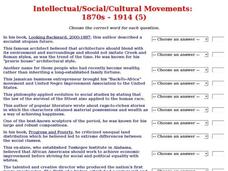Hampton-Brown
From "First Crossing"
Young scholars look closely at four tales taken from the collection of short stories, First Crossing edited by Donald R. Galloby. While examining the life of four teenagers and the lives they lead as U.S. immigrants,...
Curated OER
Cowboys
Young scholars analyze cowboy literature. In this United States history and literacy lesson, students listen to a variety of cowboy songs and poetry, view the video "Rediscovering America: The Real American Cowboy," and view related...
Curated OER
A Cultural Study of Arkansas and Saline County for Eleventh Grade Non-College American Literature
Eleventh graders divide into research groups and select a topic to pursue from a list that ranged from historical sites to local ghost stories to the nearby aluminum plant.
Yale University
"This is Not a Story to Pass On": Teaching Toni Morrison's Beloved
Tenth graders read "Beloved" by Toni Morrison. In groups, they research the life and works of Morrison and read a speech by Sojouner Truth. Using the novel, they discuss the experiences of slaves and the effect of slavery on their...
Curated OER
My Brother Sam is Dead: A study of the Revolutionary War
Fifth graders complete an analysis of the Revolutionary War through literature. After "My Brother Sam Is Dead," students create a time capsule containing items that would be relevant during the Revolutionary War. They identify key...
Curated OER
For Whom the Bell Tolls Quiz
CliffsNotes has generated 15 multiple choice questions based on Ernest Hemingway's For Whom the Bell Tolls. Bring your class to the computer lab to check their basic recall of the story's events.
Curated OER
The Purloined Letter
These questions about Poe's The Purloined Letter focus on publication and outside sources along with details of the story. Hopefully this story is not a mystery to you!
Curated OER
The History of Maple Syrup
Students explore the process of harvesting maple syrup. In this science and history lesson, students make their own maple syrup and create a picture book that shows the Native American and American pioneer methods of making the syrup.
The Kennedy Center
Fairy Tale Variations
Here are two great lessons that work together and are inspired by the Stephen Sondheim musical Into the Woods. Young writers and actors will retell the story of "The Frog Prince" through games, improvisational script writing, and...
Curated OER
Analyzing the Use of Irony in a Short Story
Ninth graders examine how literature connects to real-life and see how irony aids in the development of theme. They read Shirley Jackson's The Lottery, and discuss elements of foreshadowing and situational irony. Then learners will write...
Japan Society
Akutagawa Ryunosuke and the Taisho Modernists
Japan's Taisho Period was a time when authors like Akutagawa and other Japanese modernists began to experiment with point of view and literary form, making the literature produced during this time period a natural choice for teaching...
What So Proudly We Hail
The Meaning of America: Freedom and Religion
The United States of America was founded on firm ideals of both the pursuit of happiness and a spirit of reverence. Through a close reading of Nathaniel Hawthorne's "The May-Pole of Merry Mount," you can examine what some consider was a...
Curated OER
Dramatizing History in Arthur Miller's The Crucible
High schoolers study the effect of history on fictional or dramatic works of art by reading, Arthur Miller's, The Crucible. They examine the ties between a nation's history and culture with the literature it produces.
What So Proudly We Hail
The Meaning of America: Equality
What if society sought equality by handicapping the gifted and dispelling any traces of diversity? Kurt Vonnegut Jr. offers one possible answer to this question through his incredibly engaging and thought-provoking satirical...
What So Proudly We Hail
The Meaning of America: National Identity and Why It Matters
Combining a close reading of a classic American text with the study of history can be a very powerful strategy, and this is most certainly the case with this resource using Edward Everett Hale's The Man without a Country. Consider themes...
Curated OER
Intellectual/Social/Cultural Movements: 1870s - 1914 (5)
In this online interactive American history worksheet, students answer 12 matching questions regarding late 1870's-1914 America. Students may submit their answers to be scored.
Curated OER
The Treasure of the Sierra Madre: An American Grail?
Students discuss the possibility of a treasure lost in the Sierra Madre mountains that could be considered the American holy grail. After reading a novel, they examine the relationship between the grail, gold, and characters. To end the...
Curated OER
White Anti-Racist Biographies: Early Grades
Students research white anti racists including Laurie Olsen, Myles Horton, and others. In this anti racist lesson plan, students complete an online treasure hunt where they research these people and fill in the blanks to sentences...
Curated OER
The Collaborative Works of Rodgers and Hammerstein: Show Business
Students study the work of Rodgers and Hammerstein in an historical context of the development of American musical theatre as an art form. Students explore "roots" of the genre as it evolves in last half of the 19th and first two decades...
Curated OER
Poet James Whitcomb Riley: Famous in His Own Day
An engaging biography of "Hoosier" poet James Whitcomb Riley serves as a springboard for study of his unique dialect-based verse. Several activities illuminate differences between spoken vernacular and formal language. Learners record...
Curated OER
Reading Teammates
Fourth graders read the book "Teammate" after participating in pre-reading activities that include examining the concepts of segregation and discrimination. In this six week literature study, they make timelines, discuss what they know...
Curated OER
The Literature of Upheaval
In groups, 8th graders read different documents and answer questions on the Civil War period. Students read documents by Thoreau, Stowe and Frederick Douglas.
Curated OER
Speaking in Grave Tones
Fourth graders examine how a change in attitudes about death took place from the late eighteenth to the early nineteenth century and was embodied in gravestones, literature, and art.
Curated OER
Leaves of Grass by Walt Whitman
In this online interactive reading comprehension worksheet, students respond to 12 multiple choice questions about Whitman's Leaves of Grass. Students may submit their answers to be scored.

























